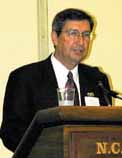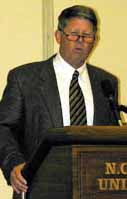 Black
overcomes coup Black
overcomes coup
to keep Speaker's post,
Basnight becomes first
five-term Senate leader
After
averting defeat by a coalition of Republicans and dissident
members of his own party -- by three or fewer votes by most
accounts -- Speaker Jim Black (top right) installed his
own coalition government in a power-sharing agreement with the
GOP.
There was no such
opening-day drama across the hall in the Senate, where President Pro Tem Marc Basnight (right)
was easily elected to a fifth term as the chamber's top dog. He
becomes the first House or Senate leader to serve more than four terms
at the helm, beating the record held by Liston Ramsey.
Officially, Black was re-elected speaker in a 117-0 landslide
as House's the first official business of the new session on
Jan. 24. But that was after ringleaders of a coup realized they
were a very few votes short of a majority and threw in the
towel. This was the same bunch that tried to deny Black the
gavel two years ago -- the Republican caucus under the
leadership of Rep. Leo Daughtry (R-Johnston) and a few
dissident Democrats led by Rep. Toby Fitch (D-Wilson).
Their plan was for Daughtry to deliver the votes of all 58
House Republicans and Fitch to deliver the votes of seven or
eight Democrats. With that working majority of the 120-member
House, Fitch would be speaker, Daughtry would be speaker pro
tem and Republicans would be appointed chairs of several major
committees.
 But the plot fell apart at the last minute when several
Republicans -- some observers said it was seven or eight --
refused to vote for Fitch (right). In fact, only 50 of the 58 House
Republicans attended a party caucus held hours before the
session opened at which Daughtry planned to say the deal was
done. Also, Fitch learned he couldn't deliver as many
Democratic votes as he said he could. After the caucus and
about an hour before the session was to convene, Daughtry took
the long walk to Black's office to concede defeat and sue for peace.
But the plot fell apart at the last minute when several
Republicans -- some observers said it was seven or eight --
refused to vote for Fitch (right). In fact, only 50 of the 58 House
Republicans attended a party caucus held hours before the
session opened at which Daughtry planned to say the deal was
done. Also, Fitch learned he couldn't deliver as many
Democratic votes as he said he could. After the caucus and
about an hour before the session was to convene, Daughtry took
the long walk to Black's office to concede defeat and sue for peace.
Black, playing the statesman role, told Daughtry a
power-sharing offer he had made a day before was still on the
table -- to appoint Republicans co-chairs of 15 committees,
including Appropriations, Finance and Redistricting, and to
appoint an equal number of Republicans and Democrats to the
redistricting committee. Daughtry took the deal.
"With the Democratic and Republican numbers as
close as they are we must learn to live together and share
power," Black said later that day in his acceptance
speech. "That’s what I’ve tried to do over the past two
years, and that’s what I pledge to continue over the next
two years." Read
the complete text of Black's remarks.
"Hopefully
we won’t find a need for new revenues—we can generate it
through new technologies and advancements of this new world on
how to reach people," Basnight said in his opening-day
remarks. "We have to continue to fully examine the more
economic depressed regions of our state to see that they can
lift up themselves on their own—that is all they ask and
that is all they need. Read
the complete text of Basnight's remarks. |
 See the complete list
of Senate committee chairs, co-chairs and members
See the complete list
of Senate committee chairs, co-chairs and members
 See
the list of House and Senate officers See
the list of House and Senate officers
Most
Senate committees
remain under the same leaders
 Eighteen
senators will continue as chairs or co-chairs of committees
they headed last session, according to appointments announced
by Senate President Pro Tem Marc Basnight. But more than a
dozen senators are in new leadership positions. Eighteen
senators will continue as chairs or co-chairs of committees
they headed last session, according to appointments announced
by Senate President Pro Tem Marc Basnight. But more than a
dozen senators are in new leadership positions.
The Senate leader created two new panels, the Rural
Development Committee and the Information Technology
Subcommittee of the Appropriations/Base Budget
Committee.
Rural Development will focus on issues raised by the Rural
Economic Development Task Force. Co-chairing that panel will
be Sens. David Weinstein (D-Robeson) and Steve Metcalf
(D-Buncombe) chair the rural development panel.
The Information Technology subcommittee will explore ways of
funding improvements in technology. It will be chaired by Sen.
Eric Reeves (D-Wake), chair of the parent Information
Technology Committee.
Other noteworthy appointments:
 Sen. Brad Miller
(D-Wake) was named senior chair of the Senate Redistricting
Committee. Sens. Frank Ballance (D-Warren) and Steve Metcalf
(D-Buncombe) will be are co-chairs. Membership of the
Redistricting Committee includes 31 of the 50
senators -- 25 Democrats and six Republicans.
Sen. Brad Miller
(D-Wake) was named senior chair of the Senate Redistricting
Committee. Sens. Frank Ballance (D-Warren) and Steve Metcalf
(D-Buncombe) will be are co-chairs. Membership of the
Redistricting Committee includes 31 of the 50
senators -- 25 Democrats and six Republicans.
 Sen. Howard Lee
(D-Orange) was named co-chair of the Appropriations
Committee, the post that had been held by Lt. Gov. Beverly
Perdue. Lee was a co-chair of the Appropriations Subcommittee
on Education and the Senate Education Committee last
session.
Sen. Howard Lee
(D-Orange) was named co-chair of the Appropriations
Committee, the post that had been held by Lt. Gov. Beverly
Perdue. Lee was a co-chair of the Appropriations Subcommittee
on Education and the Senate Education Committee last
session.
 Sen. Lee's
departure from the Appropriations subcommittee spots leaves
Sen. Walter Dalton (D-Rutherford) as senior chair, with two
new co-chairs on each panel -- Sen. Jeanne Lucas (D-Durham)
and Sen. Linda Garrou (D-Forsyth) on the appropriations
subcommittee and Lucas and Sen. Charles Carter (D-Buncombe) on
the Education Committee. Sen. Lee's
departure from the Appropriations subcommittee spots leaves
Sen. Walter Dalton (D-Rutherford) as senior chair, with two
new co-chairs on each panel -- Sen. Jeanne Lucas (D-Durham)
and Sen. Linda Garrou (D-Forsyth) on the appropriations
subcommittee and Lucas and Sen. Charles Carter (D-Buncombe) on
the Education Committee.
 Other new chairs
include Sens. Ellie Kinnaird (D-Orange) on Children &
Human Resources, Dan Clodfelter (D-Mecklenburg) on Judiciary
1; and Kay Hagan (D-Guilford) on Judiciary 2. Other new chairs
include Sens. Ellie Kinnaird (D-Orange) on Children &
Human Resources, Dan Clodfelter (D-Mecklenburg) on Judiciary
1; and Kay Hagan (D-Guilford) on Judiciary 2. |
|
House
Officers for the Session
Speaker: James B. Black
Speaker Pro Tempore: Joe Hackney
Majority Leader: Rep. Phil Baddour of Goldsboro
Majority Whips: Andrew T. Dedmon, Beverly Earle
Minority Leader: Leo Daughtry of Smithfield
Minority Whip: Frank Mitchell of Olin
Principal Clerk: Denise G. Weeks
Sergeant-at-Arms: Robert R. Samuels
Return to main page |
Senate
Officers
for the Session
President Pro Tem:
Marc K. Basnight
Deputy Pres. Pro Tem: Frank Ballance
Majority Leader: Tony Rand
Majority Whip: Luther H. Jordan, Jr.
Minority Leader: Patrick J. Ballantine
Minority Whip: James Forrester
Principal Clerk: Janet B. Pruitt
Reading Clerk: LeRoy Clark, Jr.
Sergeant-at-Arms: Cecil R. Goins
|